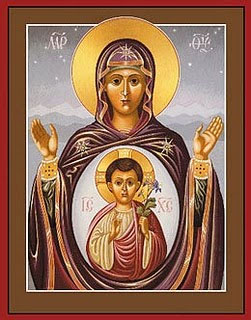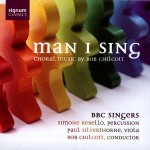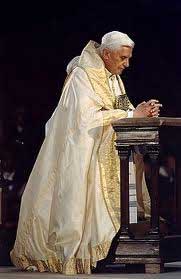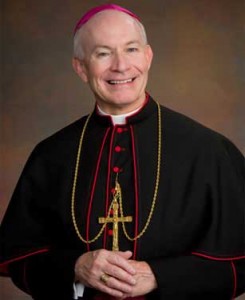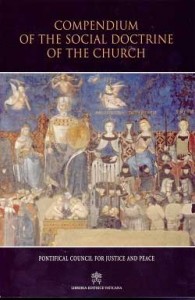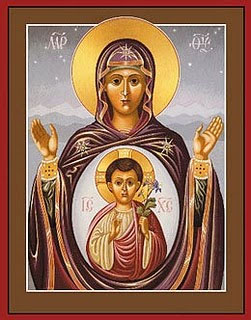O Sapientia (O Wisdom)
O Wisdom, O holy Word of God,
you govern all creation with your strong yet tender care.
Come and show your people the way to salvation.
Isaiah had prophesied, “The spirit of the Lord shall rest upon him: a spirit of wisdom and of understanding, a spirit of counsel and of strength, a spirit of knowledge and fear of the Lord, and his delight shall be the fear of the Lord.†(11:2-3), and “Wonderful is His counsel and great is His wisdom.†(28:29).
For greater text and musical credit visit
the Discerning Hearts O Antiphon page
Choral Music by Bob Chilcott
Performed by the BBC Singers
This entry was posted on Wednesday, December 17th, 2014 at 12:09 am
You can follow any responses to this entry through the RSS 2.0 feed.
USCCA2- Episode 2-Â God Comes to Meet Us
[powerpress]
Archbishop Lucas offers insights on the US Catholic Catechism for Adults Chapter 2:
Through the use of reason, we can learn much about God from both creation and conscience, but Revelation enables us to learn about God’s inner life and his loving plan to save us from sin and share in his divine life.  No amount of unaided thinking could penetrate such a mystery.  God freely chose to share this hidden mystery with us . God’s sharing was an act of friendship  for us, revealing himself as one reveals his or her heart to a friend.  Love does such things.
The Most Reverend George J. Lucas leads the Archdiocese of Omaha.Â
For other episodes in the visit our Archbishop George Lucas page
This programs is based on:
More information can be found here.
We wish to thank the USCCB for the permissions granted for use of  relevant material used in this series.
Also we wish to thank Teresa Monaghen and Deacon Chuck Adams for their vocal talents in this episode.
Tags: Archbishop George Lucas, Archbishop Lucas, creation, USCCB
This entry was posted on Monday, September 16th, 2013 at 9:52 am
You can follow any responses to this entry through the RSS 2.0 feed.
Episode 2 – The School of Prayer: Reflections on the teachings of Pope Benedict XVI –  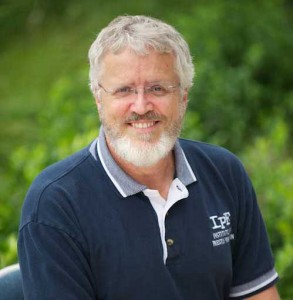 Faith and reason in the life of prayer.  Allowing God to effect our minds, as well as our hearts.  If you let God close you will be free…to let him in so close that God prays in you.  Letting God’s love be the norm of our culture…in the other and in the poor.  The role of silence in prayer and posture of kneeling.
Faith and reason in the life of prayer. Â Allowing God to effect our minds, as well as our hearts. Â If you let God close you will be free…to let him in so close that God prays in you. Â Letting God’s love be the norm of our culture…in the other and in the poor. Â The role of silence in prayer and posture of kneeling.
[powerpress]
Deacon James Keating, PhD, the director of Theological Formation for the Institute for Priestly Formation, located at Creighton University, in Omaha.
From  Pope Benedict’s 2nd audience on prayer:
A look at recent history reveals the failure of the predictions of those who, in the age of the Enlightenment, foretold the disappearance of religions and who exalted absolute reason, detached from faith, a reason that was to dispel the shadows of religious dogmatism and was to dissolve the “world of the sacredâ€, restoring to the human being freedom, dignity and autonomy from God. The experience of the past century, with the tragedy of the two World Wars, disrupted the progress that autonomous reason, man without God, seemed to have been able to guarantee.
The Catechism of the Catholic Church says: “In the act of creation, God calls every being from nothingness into existence…. Even after losing through his sin his likeness to God, man remains an image of his Creator, and retains the desire for the one who calls him into existence. All religions bear witness to man’s essential search for Godâ€Â (n. 2566). We could say — as I explained in my last Catecheses — that there has been no great civilization, from the most distant epoch to our day, which has not been religious.
For more information on the “Institute of Priestly Formation†and for other material available by Deacon Keating, just click here
Don’t forget to pickup a copy of “Communion with Christ†, it is one of the best audio sets on prayer…ever!
Check out Deacon Keating’s “Discerning Heart†page
Tags: creation, Deacon James Keating, sin, witness
This entry was posted on Wednesday, April 17th, 2013 at 12:42 am
You can follow any responses to this entry through the RSS 2.0 feed.
[powerpress]
Archbishop Lucas offers insights on the US Catholic Catechism for Adults Chapter 27:
The Catechism starts its reflection on the Third Commandment with the scriptural meaning of the Sabbath. Exodus 20:8-11 states that the Sabbath was the seventh day on which the Lord rested after the work of the previous six days. Deuteronomy 5:12 adds that the Sabbath is a day of our renewing the covenant with God. The Sabbath is connected to creation and covenant.
God’s “rest†on the seventh day was his contemplative gaze enjoying the good of creation, especially its crown in man and woman. It was not a matter of divine inactivity, but rather the deeper “work†of contemplation and the restful act of loving us (cf. CCC, nos. 2184-2185). This is true also of ourselves. If we never stop working, when would we ever have time to contemplate and worship God and nourish a love relationship with him or with anyone else? Every human person, having been created by God, owes him worship and thanksgiving for what the Lord has done and continues to do.
United States Conference of Catholic Bishops (USCCB)
The Most Reverend George J. Lucas leads the Archdiocese of Omaha.Â
For other episodes in the visit our Archbishop George Lucas page
This programs is based on:
More information can be found here.
We wish to thank the USCCB for the permissions granted for use of  relevant material used in this series.
Also we wish to thank Bruce McGregor  for his vocal talents in this episode.
[ezcc]
Tags: creation, Third Commandment, USCCB, work
This entry was posted on Monday, February 11th, 2013 at 3:01 pm
You can follow any responses to this entry through the RSS 2.0 feed.
USCCA5- Episode 5-Â I Believe in God
[powerpress]
Archbishop Lucas offers 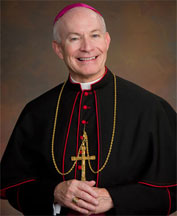 insights on the US Catholic Catechism for Adults Chapter 5:
insights on the US Catholic Catechism for Adults Chapter 5:
Revelation tells us that he living and personal, and profoundly close to us in creating and sustaining us. Though he is totally other, hidden, glorious, and wondrous, he communicates to us through creation us and reveals himself to us through the prophets and above in Jesus Christ, whom we meet in the Church, especially in Scripture and the Sacraments.  In many ways,  God speaks to our hearts where we may welcome his loving presence.
The Most Reverend George J. Lucas leads the Archdiocese of Omaha.Â
For other episodes in the visit our Archbishop George Lucas page
This programs is based on:
More information can be found here.
We wish to thank the USCCB for the permissions granted for use of  relevant material used in this series.
Also we wish to thank Omar Gutierrez and Denise Wharton  for their vocal talents in this episode.
Tags: Archbishop Lucas, Church, creation, USCCB
This entry was posted on Monday, October 15th, 2012 at 12:03 pm
You can follow any responses to this entry through the RSS 2.0 feed.
Episode 19- Regnum Novum: Bringing forth the New Evangelization through Catholic Social Teaching with Omar Gutierrez – We begin the study of the “Compendium of the Social Doctrine of the Church” Â Chapter 1
– We begin the study of the “Compendium of the Social Doctrine of the Church” Â Chapter 1
[powerpress]
CHAPTER ONE
GOD’S PLAN OF LOVE FOR HUMANITY
I. GOD’S LIBERATING ACTION IN THE HISTORY OF ISRAEL
a. God’s gratuitous presence
b. The principle of creation and God’s gratuitous action
II. JESUS CHRIST, THE FULFILMENT OF THE FATHER’S PLAN OF LOVE
a. In Jesus Christ the decisive event of the history of God with mankind is fulfilled
b. The revelation of Trinitarian love
We live at a very special time. The confluence of many things has brought forth the clear need to be able to articulate the Social Teaching of the Catholic Church in a way that is accessible and applicable. This is not to be an effort where high-minded theories are to be bandied about. Rather, this is a time of opportunity wherein we can apply the Social Doctrine to the concrete so as to bring about a New Kingdom, a Revolution. – Omar G.
Also visit Omar’s “Discerning Hearts” page Catholic Social Teaching 101
Tags: catholic social doctrine, catholic social teaching, creation, scripture
This entry was posted on Tuesday, September 4th, 2012 at 8:37 am
You can follow any responses to this entry through the RSS 2.0 feed.
USCCA1- Episode 1- My Soul Longs For You, O God (Ps 42:2)
[powerpress]
Archbishop Lucas offers insights on the US Catholic Catechism for Adults Chapter 1:
How is our quest for God awakened? Â God first pursues us; this spurs us to search for him for whom we were made. Â the Catechism presents three paths through which every person can come to God; creation, the human person, and Revelation. Â In the next chapter, Revelation will be presented as the greatest and most essential path to God. Â He is discovered also through creation and through the mystery of our inner life.
The Most Reverend George J. Lucas leads the Archdiocese of Omaha.Â
For other episodes in the visit our Archbishop George Lucas page
This programs is based on:
More information can be found here.
We wish to thank the USCCB for the permissions granted for use of  relevant material used in this series.
Also we wish to thank Teresa Monaghen and Deacon Chuck Adams for their vocal talents in this episode.
Tags: Archbishop Lucas, catholic, Catholic Catechism, catholic podcast, catholic prayer, cathollc spirituality, creation, George Lucas, human person, The United States Catholic Catechism, united states catholic catechism for adults, USCCB
This entry was posted on Tuesday, February 28th, 2012 at 12:51 am
You can follow any responses to this entry through the RSS 2.0 feed.
you govern all creation with your strong yet tender care.
Come and show your people the way to salvation.
[powerpress]
Isaiah had prophesied, “The spirit of the Lord shall rest upon him: a spirit of wisdom and of understanding, a spirit of counsel and of strength, a spirit of knowledge and fear of the Lord, and his delight shall be the fear of the Lord.†(11:2-3), and “Wonderful is His counsel and great is His wisdom.†(28:29).
For greater text and musical credit visit
the Discerning Hearts O Antiphon page
Tags: catholic, catholic podcast, catholic prayer, cathollc spirituality, creation, fear, o antiphon, o sapientia, o wisdom
This entry was posted on Saturday, December 17th, 2011 at 12:06 am
You can follow any responses to this entry through the RSS 2.0 feed.

